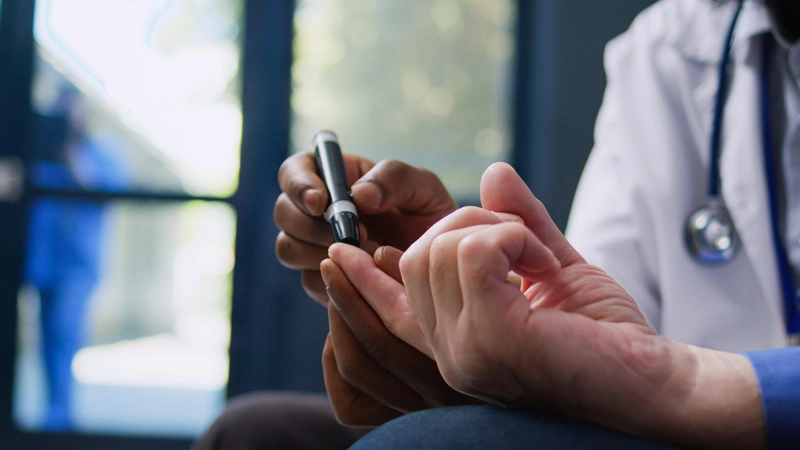Read Blog 
Understanding Diabetes Type 2 Symptoms: A Simple Guide
Diabetes is a common health condition that affects millions of people around the world. Among its different types, Type 2 diabetes is the most widespread. It often develops slowly and can go unnoticed for years. That's why it’s important to understand the symptoms of diabetes type 2, so you can take timely action and protect your health.
In this blog, we will explain what Type 2 diabetes is, the signs to watch out for, and when to see a doctor.
What is Type 2 Diabetes?
Type 2 diabetes is a chronic condition where your body either doesn't produce enough insulin or can’t use it properly. Insulin is a hormone that helps your body control blood sugar (glucose) levels. Without enough insulin, sugar builds up in your bloodstream instead of being used for energy.
This buildup of sugar can damage your organs over time, including your heart, kidneys, eyes, and nerves. That’s why early detection and treatment are very important.
Who is at Risk?
Type 2 diabetes can affect anyone, but some people are more likely to get it. You may have a higher risk if you:
-
Are overweight or obese
-
Have a family history of diabetes
-
Are over the age of 45
-
Live a sedentary (inactive) lifestyle
-
Have high blood pressure or cholesterol
-
Had gestational diabetes during pregnancy
-
Belong to certain ethnic groups (such as South Asian, African-Caribbean, or Hispanic)
Knowing your risk factors can help you stay alert and get tested early.
Common Diabetes Type 2 Symptoms
The symptoms of Type 2 diabetes often develop slowly, and many people may not notice them right away. Some people don’t experience any symptoms at all until complications arise. That’s why it’s sometimes called a "silent" disease.
Here are the most common diabetes 2 symptoms to look out for:
1. Frequent Urination
If you find yourself needing to urinate more often than usual, especially at night, it could be a sign of high blood sugar. Your body tries to get rid of the excess glucose through urine.
2. Excessive Thirst
Frequent urination can make you lose a lot of water, leading to dehydration. This makes you feel unusually thirsty all the time.
3. Increased Hunger
Despite eating enough, people with Type 2 diabetes may feel hungry more often. This is because the body isn’t using the glucose in the blood properly for energy.
4. Fatigue and Tiredness
When your body can’t use sugar for fuel, it leads to low energy levels. This can make you feel tired, weak, or sluggish even after a good night's sleep.
5. Blurred Vision
High blood sugar levels can affect the tiny blood vessels in your eyes, leading to blurry vision. If untreated, it can even cause permanent eye damage.
6. Slow Healing Wounds
Cuts, bruises, or infections may take longer to heal if your blood sugar is high. This happens because diabetes affects blood circulation and the immune system.
7. Tingling or Numbness
Many people with diabetes experience tingling, pain, or numbness in their hands or feet. This is known as diabetic neuropathy and is caused by nerve damage due to high blood sugar.
8. Unexplained Weight Loss
If you're losing weight without trying, it could be a warning sign. When your body can’t use sugar properly, it starts burning fat and muscle for energy.
9. Skin Problems
Dark patches on the skin, especially around the neck or armpits (a condition called acanthosis nigricans), can be an early sign of insulin resistance.
When Should You See a Doctor?
If you notice any of the above symptoms, it’s important to see a healthcare provider for a simple blood sugar test. Early diagnosis can help you manage the condition better and prevent serious complications.
Even if you feel fine, it's a good idea to get regular health check-ups, especially if you’re at higher risk.
How is Type 2 Diabetes Diagnosed?
Doctors use the following tests to diagnose Type 2 diabetes:
-
Fasting blood sugar test: Measures blood sugar after not eating for 8 hours
-
HbA1c test: Shows your average blood sugar levels over the last 2-3 months
-
Oral glucose tolerance test: Measures how your body handles sugar after drinking a sweet drink
-
Random blood sugar test: Can be done at any time of the day
Your doctor may repeat tests or use more than one type to confirm the diagnosis.
Can Type 2 Diabetes be Managed?
Yes! Type 2 diabetes can be managed with lifestyle changes, medications, and regular monitoring. Some people are even able to reverse it through weight loss and healthy habits.
Here’s how you can manage it:
-
Eat a balanced diet: Include whole grains, vegetables, lean proteins, and fruits
-
Exercise regularly: Aim for at least 30 minutes of activity most days of the week
-
Lose excess weight: Even a small amount of weight loss can improve your blood sugar
-
Take medications if needed: Your doctor may prescribe tablets or insulin
-
Monitor blood sugar: Keep track of your glucose levels as advised by your doctor
-
Avoid smoking and alcohol: These can worsen diabetes and its complications
Final Thoughts
Type 2 diabetes is a serious condition, but it can be controlled and even reversed with the right steps. Understanding the early warning signs and diabetes 2 symptoms can make a big difference in your health journey.
If you or someone you love is experiencing these symptoms, don’t wait—talk to a doctor today and get tested. Early action can help you lead a healthier, longer life.
Take control of your health today—recognize the diabetes 2 symptoms early and consult your doctor for a proper diagnosis and care plan.










